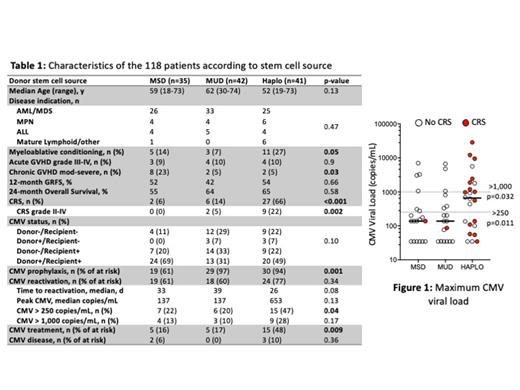Background: Post-transplant cyclophosphamide (PTCy) enables safe haploidentical stem cell transplantation by reducing graft-versus-host-disease (GVHD) but is associated with an increased risk of reactivation of Cytomegalovirus (CMV). PTCy has more recently been adopted for matched-donor transplants, where early CMV reactivation may also be more common. This suggests that CMV reactivation is a function of PTCy rather than donor source. However, other studies comparing the rates of CMV in transplants using PTCy-based prophylaxis suggested disparity in donor source may contribute to CMV reactivation.
Aim: The goal of this single-centre, retrospective study was to determine if donor type had any impact on CMV reactivation in the setting of PTCy-based GVHD prophylaxis.
Methods: The Alfred Hospital Bone Marrow Transplantation Unit has used PTCy for GVHD prophylaxis in both haploidentical and matched-donor allogeneic stem cell transplants (alloSCT) since 2015. A local database search identified 119 allogeneic peripheral blood alloSCT recipients receiving PTCy-based GVHD prophylaxis between February 2015 and December 2022. Matched-donor alloSCTs also received cyclosporin from Day +5 while haploidentical alloSCTs also received tacrolimus and mycophenolate from Day +5. One patient was excluded due to CMV viremia at the time of transplant. Recipients who were CMV seropositive received therapeutic dose valganciclovir 900 mg twice daily from the start of conditioning until the day prior to stem cell infusion. Prophylactic valganciclovir (900 mg daily) was planned upon engraftment for seropositive recipients and those receiving stem cells from a seropositive donor. CMV DNA PCR was performed weekly for the first 100 days post-transplant and beyond when clinically indicated. CMV viremia was defined as any positive CMV PCR (> 34.5 copies/mL) within the first 100 days post-transplant. Therapeutic valganciclovir was initiated for CMV viral loads (VL) > 1,000 copies/mL or earlier for rapidly rising VLs. Cytokine release syndrome (CRS) was defined as fever > 38 degrees Celsius between stem cell infusion and PTCy on Day +3 without an alternate explanation and graded according to CTCAE criteria. CMV donor and recipient negative transplants were excluded from the analysis of the impact of donor disparity on CMV reactivation. Statistical analyses included Fisher's Exact test, one-way ANOVA and Binomial Logistic Regression.
Results: Transplant characteristics according to donor source were similar apart from conditioning intensity, where recipients of haploidentical stem cells were more likely to receive myeloablative conditioning (Table 1). The cumulative incidence of moderate-severe chronic GVHD was significantly higher in matched sibling transplants but overall, 12-month GVHD-free and relapse-free survival were similar. As previously reported, CRS (overall and grades II-IV) was significantly more common in haploidentical transplants.
Day 100 CMV viremia rates were not statistically different between donor groups. However, haploidentical transplants trended for earlier CMV reactivation (p=0.08), and were significantly more likely to rise above 250 copies/mL (Table 1 and Figure 1). Consequently, haploidentical transplant recipients received significantly more anti-CMV therapy (p=0.009).
Multivariable analysis identified haploidentical donor as a major risk factor for CMV > 250 (odds ratio, OR 1.24, p=0.011) and > 1,000 copies/mL (OR 1.41, p=0.032) while transplant for AML/MDS was negatively associated with CMV > 250 (OR 0.19, p=0.009) and CMV > 1,000 copies/mL (OR 0.16, p=0.003). CRS was significantly associated with CMV > 1,000 copies/mL (OR 3.33, p=0.032) but this was no longer significant in multivariable analysis due to the association with haploidentical donor transplantation.
Conclusion: This single-center retrospective comparison of PTCy-based transplants shows that haploidentical transplants have increased risk of early and clinically significant reactivation of CMV. Potential explanations include increased immunosuppression with mycophenolate and the presence of CRS, where inflammatory cytokines may de-repress the CMV major immediate early promoter. Selecting this high-risk group (haploidentical transplants with CRS) may be a cost-effective use of letermovir, which can be initiated prior to engraftment.
Disclosures
Tan:Schrödinger: Current Employment. Fleming:Gilead: Honoraria, Membership on an entity's Board of Directors or advisory committees, Research Funding, Speakers Bureau; AstraZeneca: Honoraria, Membership on an entity's Board of Directors or advisory committees, Research Funding, Speakers Bureau; Bristol Myers Squibb: Consultancy, Honoraria, Membership on an entity's Board of Directors or advisory committees, Research Funding, Speakers Bureau; Novartis: Consultancy, Honoraria, Membership on an entity's Board of Directors or advisory committees; Pfizer: Consultancy, Honoraria, Membership on an entity's Board of Directors or advisory committees, Research Funding, Speakers Bureau; Servier: Honoraria, Membership on an entity's Board of Directors or advisory committees, Research Funding, Speakers Bureau; Amgen: Consultancy, Honoraria, Membership on an entity's Board of Directors or advisory committees, Research Funding, Speakers Bureau. Spencer:Amgen: Consultancy, Honoraria; Haemalogix: Consultancy, Honoraria, Membership on an entity's Board of Directors or advisory committees, Research Funding, Speakers Bureau; Sanofi: Honoraria, Membership on an entity's Board of Directors or advisory committees, Research Funding, Speakers Bureau; Janssen: Consultancy, Honoraria, Membership on an entity's Board of Directors or advisory committees, Research Funding, Speakers Bureau; IDP Pharma: Honoraria, Membership on an entity's Board of Directors or advisory committees, Research Funding, Speakers Bureau; Antengene: Honoraria, Membership on an entity's Board of Directors or advisory committees, Research Funding, Speakers Bureau; BMS: Honoraria, Membership on an entity's Board of Directors or advisory committees, Research Funding, Speakers Bureau; Roche: Honoraria, Membership on an entity's Board of Directors or advisory committees; Pfizer: Honoraria, Membership on an entity's Board of Directors or advisory committees, Research Funding, Speakers Bureau; Abbvie: Consultancy, Honoraria, Research Funding, Speakers Bureau. Curtis:OTSUKA: Consultancy, Speakers Bureau.


This feature is available to Subscribers Only
Sign In or Create an Account Close Modal